Dutch election: PM Mark Rutte enjoys strong lead over rival Geert Wilders in exit polls - as it happened
The far-right leader's Freedom Party is estimated to have won 19 seats, while Mark Rutte is set to gain 31.
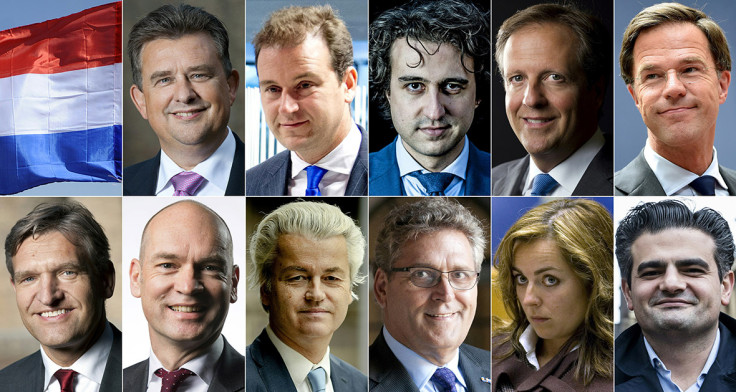
The Dutch prime minister Mark Rutte's party is on course to win the country's parliamentary elections, according to an exit poll published by Ipsos.
His centre-right VVD party has won 31 out of 150 seats, the polls suggest, and was well ahead of Geert Wilders' anti-immigration Freedom Party (PVV, which got 19 seats.
The Dutch election is the first of three high-stakes elections in key European Union countries, which will set the course for the political future of the bloc and can either contain or spread the populist tide.
In a heated debate against his main rival Geert Wilders on 13 March, the Prime Minister said he was playing "the quarterfinals in trying to prevent the wrong sort of populism from winning."
The voter turnout at this election was 82%, significantly higher than in 2012. The diplomatic row between Turkey and the Netherlands is thought to have increased the political engagement.
- IBTimes UK crunched the numbers to find out who could end up ruling the country.
- Why is Wilders such a divisive figure? Here are some his most controversial quotes.
- In a special report from Rotterdam, we asked Dutch Muslims how they feel about Wilders' popularity.
- The election followed a diplomatic row between the Netherlands and Turkey. Turkish President Recep Tayyip Erdogan started a "war of words" against the country after Rutte banned two Turkish ministers from drumming up support for Erdogan at rallies ahead of a constitutional referendum in April.
- Fed up with reading about the election? Here are 6 things we call 'Dutch' for no good reason.
Want to find out more about the Dutch election? Here are five stories about the key issues and front runners:
- Who will win the Dutch election? We crunch the numbers to find out.
- Ethnic minorities in Holland look for a political home after 40 years of being labelled as foreigners.
- Dutch Muslims will not be silenced by Geert Wilders and the politics of fear.
- Geert Wilders: How did an outsider and social recluse win so many Dutch hearts?
- 'Marked for death': How Geert Wilders used the trauma of political assassination to build a movement.
Two exit polls have been released. Both indicate the same result: the VVD has by far won the most seats (31) and enjoys a strong lead over Geert Wilders' Freedom Party, estimated to have won 19 seats, and the Christian Democratic Alliance and D66.
At 11pm Dutch time (10pm GMT) a prediction of the winners and losers, based on data gathered by the municipalities, will be announced by the news agency ANP.
At around midnight an indication of the distribution of seats will be made known.
Several polling stations have asked for permission to stay open past the closing time of 9pm (8pm GMT) due to a shortage of ballots and large numbers of voters.
The Electoral Commission has said that although the situation is "extremely annoying" all polling stations must close at 9pm. A spokesperson said that it is the responsibility of municipalities to provide the polling stations with enough ballot slips. People who as a result are not able to vote at their polling station must be directed to another station nearby.
Tired of reading about politics all day?
Here's some light relief: an article about the meaning behind commonly used expressions such as 'Dutch courage' and 'going Dutch':
Voter turnout is 6% higher than in the previous election, according to Ipsos. By 7pm Dutch time (6pm GMT) more than 70% of people had voted.
In Amsterdam, 25,000 extra voting ballots had to be printed because of the large number of people who turned up to vote.
Professor Kees Aarts, who specialises in political institutions and behaviour at the University of Groningen, told Dutch newspaper that he is surprised by the high turnout.
"For a high turnout one factor is necessary: transparency. And until recently this campaign wasn't transparent. Many voters were unhappy with the lack of content and the overwhelming amount of political parties taking part," he said.
"What is different [compared with 2012]? One event became decisive, even though it wasn't directly linked to the election: the row with Turkey. That highlighted the importance of politics and above all of political decision-making. The entire country watched on in suspense."
Lange rij stembureau gemeentehuis #verkiezingen #ikstem pic.twitter.com/JDGZbKM7Gg
— Arndt Stroink (@Astroink) March 15, 2017
The first ballots are being counted with three hours to go until voting time ends.
Foreign minister Ronald Plasterk surveyed the premises where the ballots casted by voters abroad were being counted in the capital The Hague.
Minister @RPlasterk op bezoek bij het tellen van de stemmen uit het buitenland bij de @GemeenteDenHaag: pic.twitter.com/SGQnIFpS2u
— Ministerie van BZK (@MinBZK) March 15, 2017
Meanwhile, polling company Ipsos has released an update on the turnout.
At 5.45pm local time (4.45pm GMT), 55% of the electorate voted. This is a higher percentage than in 2012, when 48% of voters had casted their ballot by that time, but a lower one than in 2006, when the turnout by then was 58%.
Long lines were forming at polling stations around the country as voters left their offices and sought to fulfil their citizens' duty before heading home.
Democratie in Nederland is springlevend. Hoge opkomst in stemlokaal Den Haag CS. pic.twitter.com/Zq2zfO43EZ
— Ernst Moeksis (@ernstmoeksis) March 15, 2017

The VVD are odds-on favourites to win the most seats this election, with 4/6 odds with Ladbrokes. The betting agency puts Wilders' party second with 5/4 on winning the most seats. The CDA comes third with 25/1, while the Green party (Groenlinks) and centrist liberal party D66 trail behind with 50/1.
Ladbrokes has 3/1 odds on Wilders becoming Prime Minister in 2017.
The presence of Turkish flags have caused controversy in a polling station in Amsterdam located inside a mosque.
A graphic designer married to a Turkish man, Elise Steilberg wrote on social media that she was voting "in a Turkish mosque, under Turkish flags, with the Turkish radio playing in the background". She also said there were flyers from the Diyanet, the country's government agency of religious affairs, spread out on the tables.
Steilberg had objected to the polling station in an earlier post. The mosque was at the centre of a fraud scandal in 2014, when it emerged it was one of two Islamic centres financed by the municipality through a EU grant that, in fact, should not have been used to finance religious institutions.
According to the municipality, no illegal campaign materials were found in the polling station upon inspection by municipal officers and no official complaints were received, either.
Quoted in the newspaper Het Parool, Amsterdam mayor Eberhard van der Laan said the flags were not strictly against the rules. But, he added: "They had nothing to do with our election. That can cause confusion".
The flag of the Diyanet movement was removed by the president of the polling station Rob Tijssen following a request from the municipality. "I think it is exaggerated," he said, quoted in the Dutch newspaper De Telegraaf. "They are only flags, four Turkish and Dutch.''
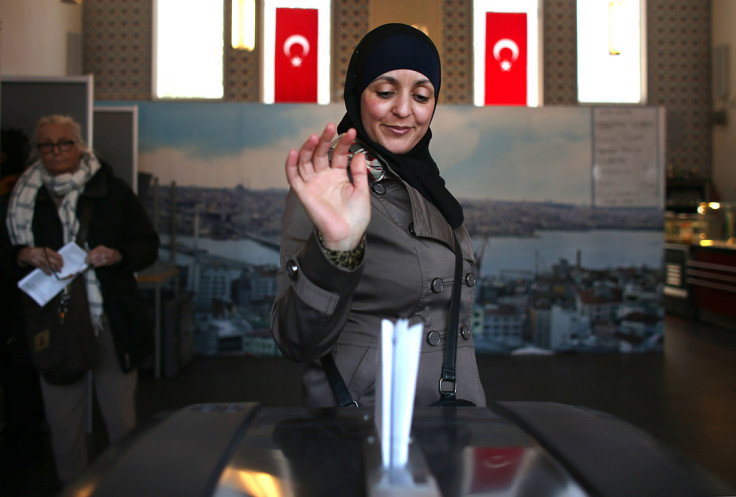
Many people were still undecided about who to vote for last night, according to ProDemos, the organisation that runs Stemwijzer, one of the main online voting guides.
A spokesperson for ProDemos said that between 600,000 and 700,000 people completed the questionnaire between 2.30pm on Tuesday (14 March) and 8.30am this morning, indicating that they were still unsure about who to entrust with their vote.
This election the guide was consulted a record 6.3 million times, significantly higher than in 2012 when the site was used 4.8 million times.
Stemwijzer and Kieskompas, another popular voting guide, were victims of a DDoS cyber attack yesterday. They were both bombarded with information requests which temporarily prevented access to the websites. Both organisations believe that they were targeted by foreign hackers and plan to press charges.
The electoral commission has taken extra measures to prevent hackers from intervening in the election outcome. Last month the electoral commission was warned by cyber security experts that the software used in previous elections was extremely susceptible to hackers. Ronald Plasterk, the Minister of Interior, said that all the ballots this year would be counted by hand as the government "100% wants to avoid this [cyber attack] from happening."
Over a third of the electorate has already voted, according to Ipsos. At the same time in the 2012 election, 27% had registered their vote.
In the municipalities of Utrecht, Groningen and Rotterdam more than 35% of people have voted.
Voter turnout in The Netherlands is relatively high. Since compulsory voting was abolished in 1972, Dutch voter turnout has on average been around 75%, significantly higher than the European average of 68%.
In the Netherlands, voters with a valid polling card and ID can vote in any polling station in their municipality, which is why some stations will record a turnout higher than 100%.
Wageningen University recorded a turnout above 100% as 1000 people showed up to vote while 900 were registered.
The country's smallest polling station in someone's living room in Marle, in the province of Overijssel. According to Dutch news agency ANP, 54 people have voted there, 7 more than the number of people registered at the polling station, including the leader of the Christian socialist party CU, Gert-Jan Segers.
In Marle is reeds 100% opkomst bereikt! @ANPPersSupport @NOS foto: opening stembureau met @mattiewietze @QmusicNL pic.twitter.com/Fvx1XOUqky
— Jort Vlam (@jortvlam) March 15, 2017
Some people are having difficulty voting. A polling station in the centre of Almere opened 15 minutes late because some of the voting boxes were not properly sealed. This prevented one man from voting as he was not able to come back later, according to regional broadcaster Omroep Flevoland.
In the east of the country, in Enschede, Erik van Bommel contacted his municipality on Twitter for advice after his dog ate his voting ballot. He was told to stick the torn pieces of the ballot back together as they were unable to issue a new voting slip. Van Bommel said it was "crazy" that they could not solve the problem with "contemporary technology."
"I feel disadvantaged that I am not able to vote," he wrote on Twitter.
@Deschaduw hallo hierbij de foto van de dader pfff pic.twitter.com/1VOWFz9X5N
— Erik Van Bommel (@ebommel17) March 15, 2017
An official communication from the Royal House of the Netherlands confirmed on 14 March that Mark Rutte has written to offer his and his cabinet's resignations.
In the Netherlands, a constitutional monarchy, it is custom that the sitting government offers its resignations to the King the day before the election.
King Willem-Alexander has no voting rights, as he is seen as an impartial figure. The same applies to his wife Queen Maxima and his mother Princess Beatrix, who abdicated in 2013 to let her son take over.
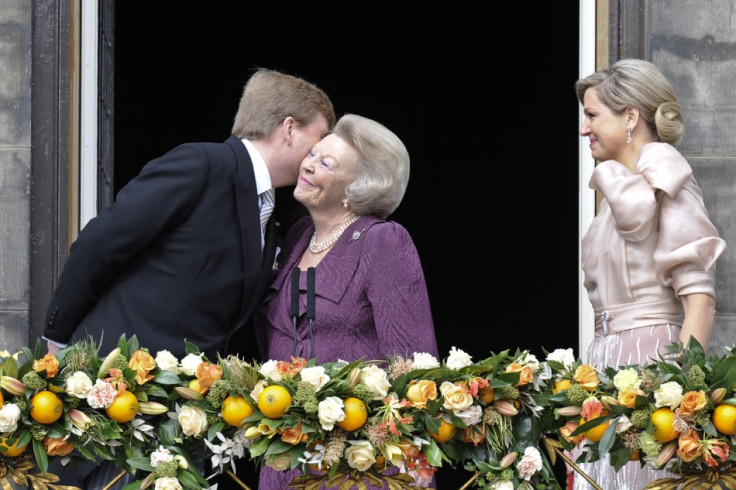
Queen Maxima, who was born in Argentina, currently holds double nationality: Dutch and Argentinian.
As the issue of double citizenship entered the campaign following the pro-Turkey protests of Turkish-Dutch nationals, Christian-Democrat CDA party leader Sybrand Buma said in a radio interview that if it were up to him, everyone should only have one passport, even the Queen. "It is more than a piece of paper: it's a choice to bind yourself to the country," he said, quoted in the magazine Elsevier.
Prime Minister Mark Rutte dismissed Buma's claim. "Keep the royal family out of this campaign," he said, as reported by Dutch journalist Wouter de Winther.
While supporters of Donald Trump embraced the slogan "Make American Great Again" with the hashtag #MAGA, supporters of far-right party leader Geert Wilders in the Netherlands and abroad are tweeting in his favour using the hashtag #MEGA, or "Make Europe Great Again".
@geertwilderspvv Good luck from 🇺🇸#MAGA
— Azi (@Lululemonchello) March 15, 2017
Vote smart Europe #MEGA
The messages of support addressed to Wilders and his party cover a whole range of styles, from the understated "Good luck from the US" to more extravagant creations.
I hope THIS happens today. Make Europe great and beautiful again!
— Peter van Liempt (@GhostOfEndscape) March 15, 2017
Vote @geertwilderspvv #wilders2017 #dutchelections #MEGA pic.twitter.com/gJt57QTFYS
Wilders' own brother Paul is instead less keen on supporting him. He told the German newspaper Spiegel that his younger brother blocked him from Twitter after he criticised him n December.
"Politically I disagree with him completely," Paul Wilders said, "But he is my brother. I believe he is unhappy. That makes me unhappy, too."
Prime Minister Mark Rutte voted in The Hague, the Dutch capital and the town where he was born.
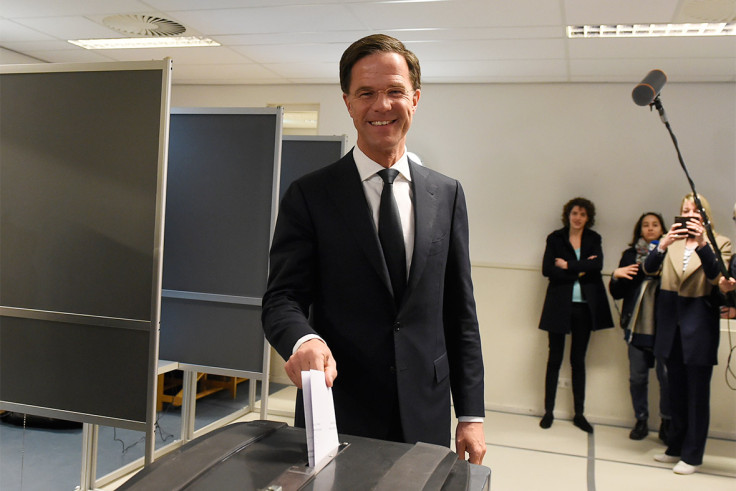
According to the Dutch news agency ANP and the newspaper NRC, the VVD party leader did not vote for himself, but for incumbent Defence Minister Jeanine Hennis-Plasschaert, the second candidate on the party list.
Rutte may have heeded the advice of the campaign "Vote for a woman" ("Stem op een Vrouw" in Dutch), although campaigners advised to vote female politicians in the lower half of the lists, as candidates in higher positions are more likely to win a place.
On the basis of single preferences alone, a candidate needs around 15,000 votes to be elected.
Nog een keer onze #stemtip. #StemopeenVrouw, verder op de lijst, die jóúw voorkeurstem nodig heeft! ▶︎ https://t.co/7mK4OChZdD #TK17. pic.twitter.com/M4DXNOlN6e
— Stem op een Vrouw (@StemopeenVrouw) March 13, 2017
The "Vote for a woman" campaign aims to increase the number of female lawmakers in parliament, where currently only 38% of the MPs are women (57 out of 150). As only 35% of the candidates for the 2017 Lower House of Parliament are women, the odds of improving that ratio are low. Only four of the 28 parties in the election are headed by a woman. One party, the Christian conservative SGP, is the only one without a single female candidate.
In the first two hours of voting, more than 10% of the electorate visited the polling stations.
Participation rates can be followed live on ad-hoc websites in the municipalities of Utrecht (17.5%), Groningen (15%) and Rotterdam (13.7%).
The polls published on 14 March evening see the ruling centre-right VVD party consolidate its lead over the far-right party PVV. The Christian-Democrat CDA party, which was once the country's biggest, is closing behind the PVV.
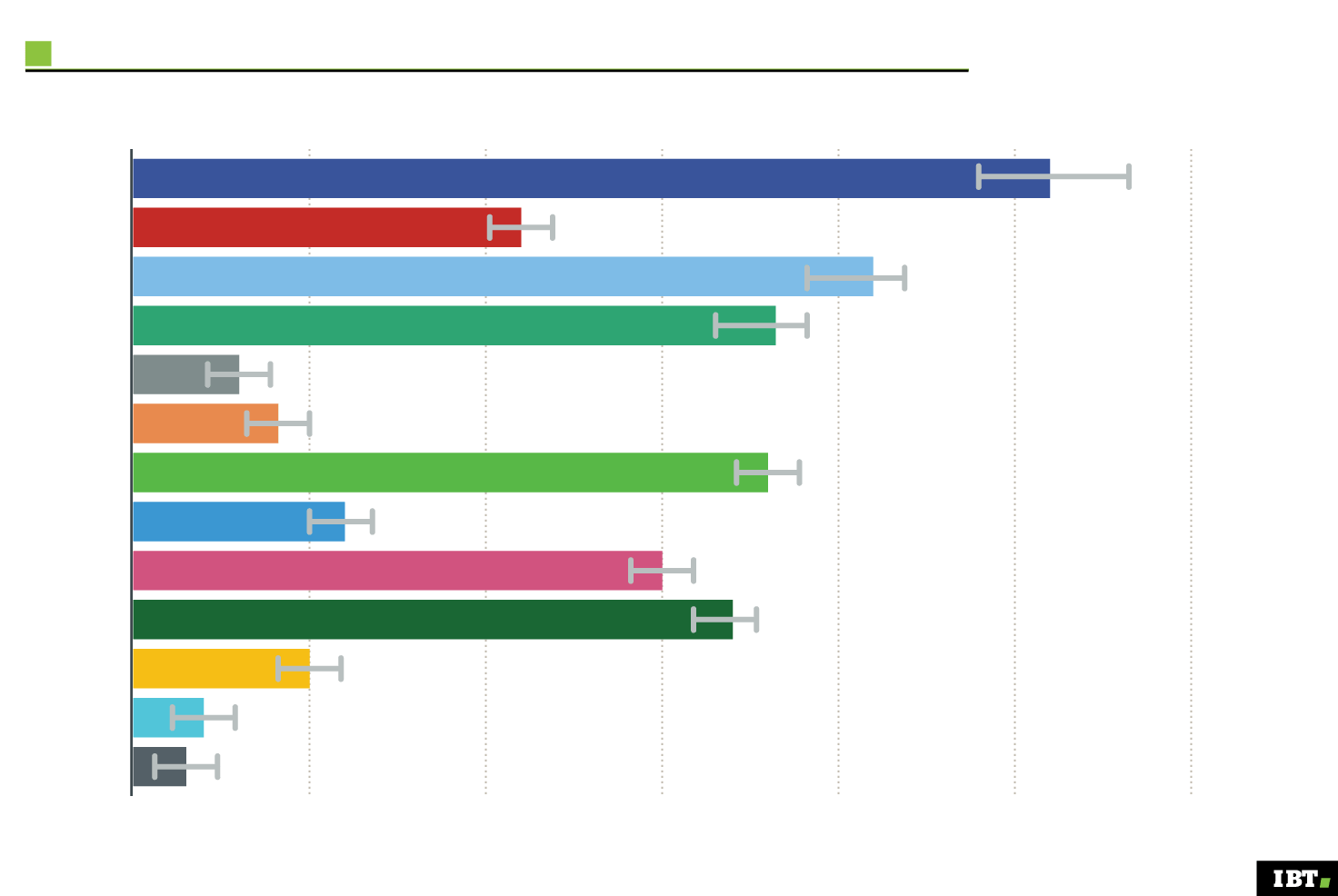
Support for each party and projected seats
Final polls ahead of 15 March election place VVD in the lead.
VVD
PvdA
PVV
CDA
SGP
50plus
D66
CU
SP
GL
PvdD
Denk
Others
0
5
10
15
20
25
30
Source: Peilingwijzer.tomlouwerse.nl
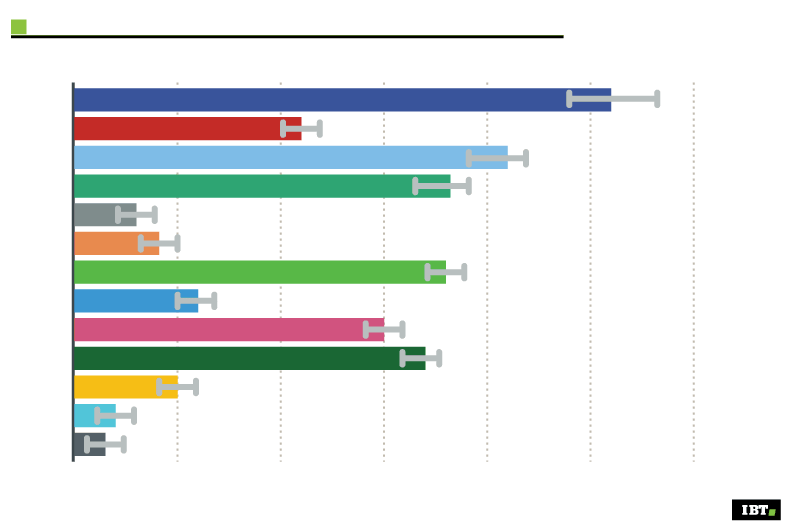
Support for each party and projected seats
Final polls ahead of 15 March election place VVD in the lead.
VVD
PvdA
PVV
CDA
SGP
50plus
D66
CU
SP
GL
PvdD
Denk
Others
0
5
10
15
20
25
30
Source: Peilingwijzer.tomlouwerse.nl
The VVD ruled together with the CDA in 2010 in a minority government supported by Wilders' PVV. Wilders withdrew his party's support due to disagreements over austerity policies in 2012, something that Prime Minister Mark Rutte has not forgotten nor forgiven.
"When the crisis was deepest he ran away from his responsibilities. He put party before country," Rutte told the press on 13 March, naming this as one of the reasons why he won't be working together with Wilders again.
The VVD and CDA may however form a government coalition once again, potentially finding a third partner in the progressive right D66 party. The Labour party (PvdA) could offer additional support should the coalition need a fourth partner to reach a 76-seat majority.

Zojuist gestemd!!#StemPVV pic.twitter.com/9lckiKv05v
— Geert Wilders (@geertwilderspvv) March 15, 2017
Surrounded by his security detail, party leader Geert Wilders casted his vote at De Walvis school in the Dutch capital of The Hague. He stopped to talk to some of the many journalists that surrounded the school.
He told RT journalist Charlotte Deubenskij: "The elite in Brussels may think twice about opening the champagne if we win", but added "nobody should be afraid" of his party.
A record-high number of viewers, 3.3 million people, watched the last debate among 13 party leaders aired on 14 March, according to data from Audience Research Foundation (SKO) reported by the Dutch newspaper de Volkskrant.
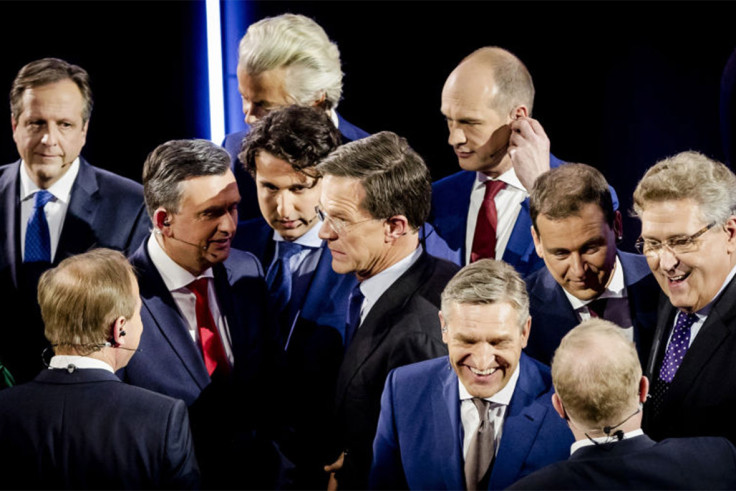
This represents more than a quarter of the voters called to the ballots on 15 March and almost double the amount of viewers that watched the final debate in 2012, 1.7 millon.
The head-to-head debate between Prime Minister Mark Rutte and PVV leader Geert Wilders attracted 2.3 million viewers.
Official campaigning may be over, but party leaders can still reach their voters through social media.
Labour party (PvdA) leader and incumbent deputy Prime Minister Lodewijk Asscher retweeted a picture shared by journalist Anne van der Meer portraying him at the polling station on 15 March.
Lodewijk Asscher en ik hebben gestemd hoor #ikhebgestemd #ivoted pic.twitter.com/EC7N7fkjeG
— Anne van der Meer (@AnneMeer) March 15, 2017
Far-right leader Geert Wilders opted to share one of his core campaign messages, inviting people to vote for his PVV party: "The Netherlands is our country".
#StemPVV pic.twitter.com/r3lNwEMzfV
— Geert Wilders (@geertwilderspvv) March 15, 2017
On the opposite side of the spectrum, 30-year-old Green party (Groenlinks) leader Jesse Klaver invited Dutch citizens to vote for change. "We have a unique opportunity to change the Netherlands. You decide in what kind of country we wake up Thursday," he wrote in a caption to a video message filmed on 14 March.
Incumbent Prime Minister Mark Rutte also shared a video through his personal Twitter account on 14 March, but his message is instead about stability. "I am bursting with the energy to continue as prime minister. To keep the Netherlands safe and stable in an uncertain world".
Voters on social media are sharing messages to encourage one another to go vote. One of the most popular quote is from Nelson Mandela: "May your choices reflect your hopes, not your fears".
Stemmen: May your choices reflect your hopes, not your fears #verkiezingsdag #stemmen #ikstem pic.twitter.com/W2Tb7hJtiK
— Jolien Posthumus (@PosthumusJolien) March 15, 2017
But others have taken a slightly more cynical attitude to the election. Pranksters in the northern city of Groningen have added another candidate to the election billboard: fictional US President Frank Underwood from the Netflix show "House of Cards".
D'això és del que parla la @beanavarro a @lavanguardia sobre #Houseofcards (foto meva a la localitat de Groningen) https://t.co/Ywp35eVsvf pic.twitter.com/6wR6fR0it4
— Anna (@annaportella_) March 15, 2017
Polls have opened in the Netherlands and voters have begun casting their votes.
Google Netherlands is reminding everyone about the day's importance through their doodle.
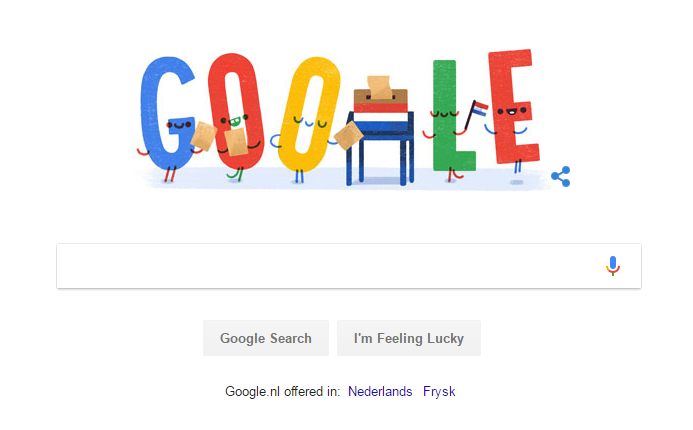
According to the latest polls released overnight, the far-right party PVV led by anti-Islam, anti-immigrant and anti-EU Geert Wilders is expected to win the second-largest amount of preferences, behind the ruling centre-right VVD party of Prime Minister Mark Rutte.
As Rutte forcefully and repeatedly excluded ruling together with Wilders, it is unlikely that the populist leader will gather enough support to form a coalition government.
But as a majority of Dutch citizen had yet to make up their minds ahead of the vote, the result of the ballots may surprise.
© Copyright IBTimes 2025. All rights reserved.






















